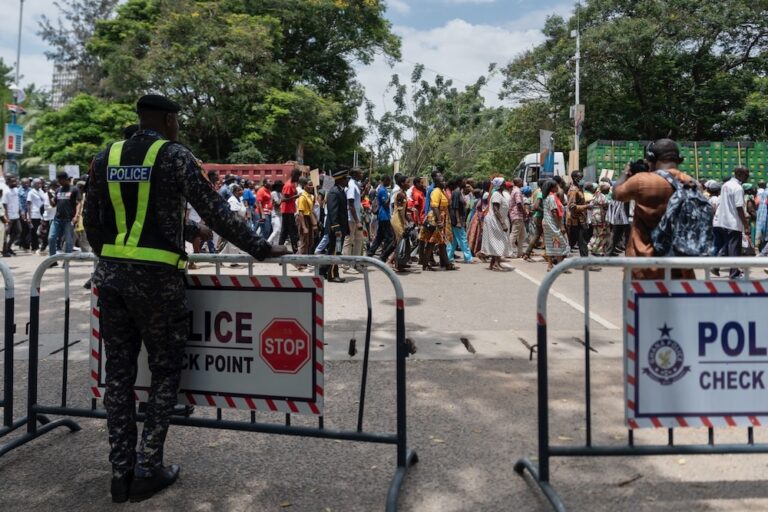(Free Expression Ghana/IFEX) – It was reported on 24 July 1998 (see IFEX alert) that two journalists, Haruna Atta, editor of “The Weekend Statesman”, and Kweku Baako Jr., editor of “The Guide”, had been found guilty of contempt of court by the Court of Appeal. The contempt conviction was handed down for publishing libellous material […]
(Free Expression Ghana/IFEX) – It was reported on 24 July 1998 (see IFEX
alert) that two journalists, Haruna Atta, editor of “The Weekend
Statesman”, and Kweku Baako Jr., editor of “The Guide”, had been found
guilty of contempt of court by the Court of Appeal. The contempt conviction
was handed down for publishing libellous material about Ghana’s First Lady,
Nana Konadu Agyemang Rawlings, in spite of an earlier court order
restraining them from so doing, pending the hearing of the substantive case
of libel brought against them by the First Lady.
**Updates IFEX alert of 24 July 1998**
Last year, the First Lady sued the two journalists and their publications
for stories they carried about her, which were based on an earlier article
which appeared in “West Africa” magazine. The magazine article, attributed
to Gamel Gorkeh Nkrumah, son of the late President Nkrumah, claimed that the
First Lady had talked to him concerning her sister, who had moved from the
camp of the Nkrumahists where she belonged by reasons of family tradition,
to join the right wing New Patriotic Party (NPP). The story was carried in
“The Statesman”, “The Weekend Statesman” and “The Guide” newspapers of the
weeks ending 19 October 1997, 31 October – 6 November 1997, and 31 October –
5 November 1997. The coverage prompted the First Lady to institute libel
proceedings in an Accra High Court against the two journalists, and seek a
perpetual injunction against the editors and their publishers.
A further action was brought by the First Lady, who sought an ex parte
motion restraining the two editors from publishing any more libellous
material about the case until the determination of the suit.
The interim injunction was upheld by Justice Owusu Sekyere, who, however,
threw out the application for contempt, whereupon counsel for the First Lady
appealed against the decision, arguing that the editors had published
matters concerning the case which were libellous since the court order.
It was this claim that was upheld on appeal by the Court of Appeal, which
held that the two journalists disobeyed the court order restraining any
further libellous publication, pending determination of the substantive
suit. When the decision of the Court of Appeal came down, lawyers for the
journalists filed a notice of appeal together with a stay of execution
pending the hearing of the application, which would allow the journalists to
remain free pending their appeal. In the meantime, however, the journalists
were taken into custody.
It is feared by many freedom of expression observers that with the upcoming
vacation of the Supreme Court, any delay in granting bail would mean that
the journalists would have to spend the next month in prison, thus, by
default, effectively serving their terms by the time the Courts resume
business in October to hear their application. The President and members of
the General Council of the Ghana Bar Association (GBA) have petitioned the
Chief Justice, Mr. Justice Isaac Kobina Abban, to ensure a hearing of the
application for bail and stay of execution in time to beat the deadline (31
July 1998), by which date the courts will go on break. In their petition to
the Chief Justice, the GBA said such a swift intervention by His Lordship
the Chief Justice “would disabuse the mind of the public about any alleged
complicity of the Judiciary in the curtailment of the individuals’
constitutional right to immediate hearing of their applications by the
Court.”
In a separate case, the Courts last week ordered the arrest and remand of
two other journalists, Nana Kofi Coomson, editor-in-chief of the “Ghanaian
Chronicle”, and Eben Quarcoo, former editor of the “Free Press”, claiming
the two were likely to jump bail in connection with criminal proceedings
pending against them in the courts. The two were charged last year under
obsolete colonial criminal libel laws for carrying articles in
their respective papers which accused the Ghana Government of
drug-trafficking (see IFEX alert of23 February 1996).
Following these developments, there have been strong reactions from a
cross-section of Ghanaians, particularly from the media front where an ad
hoc group, Friends of Freedom of Expression, organised a march to the office
of the Chief Justice to present a petition in protest against the growing
threats to press freedom by the Courts of Ghana. The group is made up of
journalists, writers, publishers, academics, lawyers, Members of Parliament,
as well as other individuals who expressed their indignation at this state
of affairs saying, “we view with sadness, and at the same time outrage, the
increasing use of the courts of our country to weaken press freedom and
intimidate journalists.”


